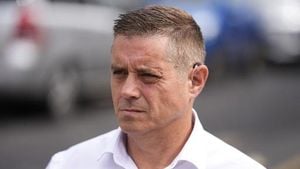On January 29, 2025, the skies over Washington D.C. were marred by tragedy as an American Airlines regional jet collided with a U.S. Army Black Hawk helicopter, resulting in the loss of 67 lives. The incident, with bodies recovered from the Potomac River, has led to intense scrutiny of the Trump administration's response, marking it as the first national crisis since his return to the presidency. President Donald Trump’s comments during the White House briefing have ignited controversy, raising questions about political accountability and air safety.
Trump began his remarks with expressions of condolences for the victims and their families, stating, “We must come together as Americans during this dark time.” But these sentiments quickly gave way to his characteristic divisive rhetoric as he pivoted to laying blame on former President Barack Obama, President Joe Biden, and transportation secretary Pete Buttigieg. “I put safety first. Obama, Biden and the Democrats put policy first,” he declared, seemingly overlooking the gravity of the moment.
The president suggested diversity hiring practices, which he linked to air traffic controller decisions, played a role in the accident. “We have to have our smartest people. It doesn’t matter what they look like,” he opined, casting doubt on the competence of personnel hired under these guidelines. Despite the lack of evidence supporting his claims, Trump’s usual tact of making sweeping assertions without substantial backing has drawn criticism. His statement, “It just could have been,” only served to deepen the controversy surrounding his remarks.
His administration’s approach is being criticized for potentially undermining the integrity of the investigations to come. Voices from the aviation industry have expressed concern over how such unpredictable and politically charged commentary can hinder professional assessments, noting the risk of eroding aviation safety reforms established over the decades. Aviation safety professionals reminded the public of the current commercial flying safety statistics, which stand at approximately one fatal incident for every 13.7 million passengers.
Trump’s rhetoric has not gone unnoticed. Former Secretary Buttigieg tweeted, “Despicable. While families grieve, Trump should be leading, not lying.” He emphasized his administration’s track record of ensuring safety during their tenure, highlighting zero commercial airline crash fatalities throughout their term. This pushback from previous administration officials indicates there is significant pushback against Trump’s unsubstantiated claims.
Many aviation experts lamented Trump's choice to side with political speculation rather than facts, warning it could lead to investigators and air traffic professionals feeling pressure to conform to political narratives instead of presenting unbiased findings. Alan Diehl, former NTSB investigator, cautioned, “How can investigators do their job objectively when they know their findings may be at odds with the president’s statements?”
Trump’s press gathering was notable for the absence of aviation experts. Instead, he surrounded himself with individuals who echoed praise for his leadership amid the crisis but lacked substantive knowledge of aviation protocols. Newly confirmed Transportation Secretary Sean Duffy did not address the significant issues at hand but instead reinforced Trump’s accusations. “We will not accept passing the buck,” he said, shortly after Trump had suggested others were responsible for the crisis.
The controversy surrounding Trump's remarks extend beyond public sentiment; they raise fundamental concerns about professionalism and safety within the aviation industry. Eric Korbitz, writing to the Milwaukee Journal Sentinel, noted, “There is far more training required to become an air traffic controller than to be president.” This calls attention to the seriousness of maintaining rigorous standards within the FAA and the broader aviation community.
Meanwhile, the aftermath of the crash serves as dire evidence of the urgent need for effective leadership following national tragedies. A president traditionally plays the role of unifier and comforter, articulately guiding the nation through grief. Instead, Trump’s political strategy sacrificed the moment for partisanship.
Throughout history, presidents have demonstrated the ability to empathize through calamity, but Trump's failure to do this indicates his inherent approach to governance. His administration's response continues to highlight the growing political polarization around significant national events. The legacy of air safety, shaped by bipartisan cooperation and expertise, is at risk when political agendas dominate public discourse.
The investigation surrounding the D.C. crash will surely analyze every aspect of the event, from air traffic control procedures to emergency responses, without allowing the shadows of partisan politics to linger. It is imperative for the families of victims and the flying public alike to receive clarity and answers grounded in professionalism.
President Trump concluded his briefing with the reassurance, “Flying is very safe. We have the safest flying anywhere,” leaving many to wonder whether confidence in his statements could hold true when juxtaposed with his earlier comments. His continuous insistence on relating safety issues to diversity hiring practices emphasizes the necessity for objective, evidence-based discussions rather than politically motivated narratives, proving more harmful than helpful.
Moving forward, aviation’s stakeholders must navigate the space left by this tragedy with caution and integrity. Trust must be restored between the agencies responsible for air safety and the general public, ensuring all air travel procedures adhere to the highest standards without being compromised by political opportunism. The legacy of safety and the memory of the victims should drive this narrative forward.



